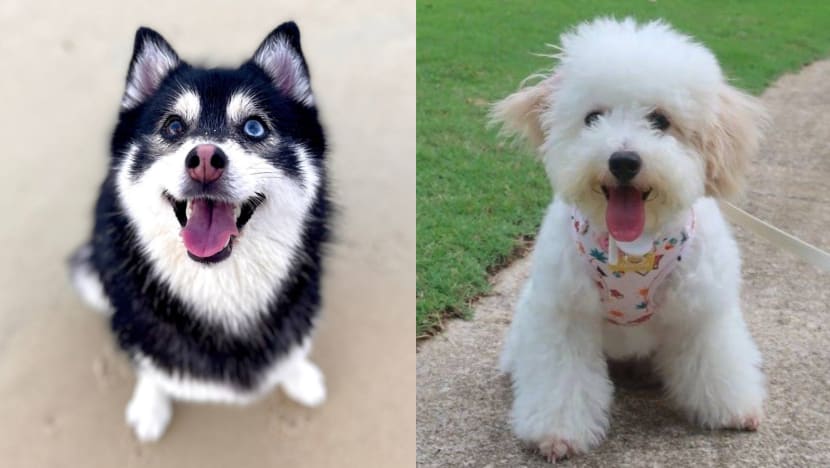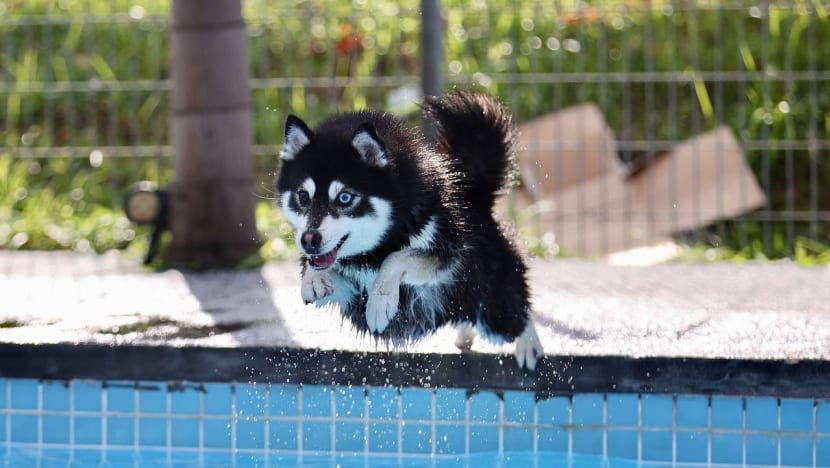Smaller, 'cuter' dogs gain popularity in Singapore despite potential health risks

Pomskies (left) and maltipoos are crossbred, miniaturised dogs, also marketed as “designer dogs” or “premium pets”. (Photos: Mrs Khoo; Belinda Lee)

This audio is generated by an AI tool.
SINGAPORE: She wanted something she could hold with one hand. So Ms Belinda Lee was initially drawn to the “teacup” puppies on her Instagram and TikTok feeds, with their “small and cute” appearance.
But that changed when a pet shop in Singapore told the 29-year-old she wouldn’t be able to walk them the way one typically does with dogs.
Instead, due to teacups being bred to be as small as possible and weighing around 2kg or less, they have to be scooped up and carried by their owners while on strolls.
Undaunted in her quest to find a tiny, “fluffy, white” dog, Ms Lee ended up with a 4kg maltipoo - a mix between a maltese and poodle.
Cross-bred, miniaturised dogs like maltipoos, cavapoos - a cavalier king charles spaniel mixed with a poodle - and pomskies - a Siberian husky and pomeranian cross - have become popular choices, animal stores told CNA.
But these canines marketed as “designer dogs” or “premium pets” could face health issues down the line, according to authorities and experts, who added that their selective crossbreeding for aesthetic purposes like miniaturisation also gives rise to ethical concerns.

Pet ownership in Singapore is on an upward trend, increasing by three per cent annually for the past five years, and by 30 per cent during the COVID-19 pandemic itself, according to a 2022 report by the US commerce department’s International Trade Administration.
Ms Aarthi Sankar, executive director of the Society for the Prevention of Cruelty to Animals (SPCA), told CNA the organisation has noticed an increase in advertisements by pet shops selling miniature as well as pedigree or purebred dogs.
“It's also common for prospective adopters to ask our adoption counsellors about the availability of ‘small to mid-sized’ dogs,” she said, adding that this may be due to a misperception that these are more suitable for families with young children, compared to larger breeds.
Pet shops that CNA spoke to cited rising demand for miniature-sized dogs, including teacups which are often bred from pedigrees including the pomeranian, maltese, poodle and shih tzu.
In 2022, a Japanese store selling teacup-sized dogs weighing under 1.8kg set up its first overseas branch in Singapore.
Another shop, Cotton Pups, said there was a growing trend of sellers tagging puppies as “mini” or “teacup” for a “quicker sale at a higher price” than those of the same breed and colour, but of "standard" size.
A pomeranian was listed on the Cotton Pups website for S$4,800 (US$3,600). CNA understands there are stores in Singapore selling teacup pomeranians for upwards of S$9,000.
SMALL AND “GENETICALLY NOT AS STRONG”
A dog owner who wanted to be identified only as Mrs Khoo said she always wanted a husky - until she realised her petite frame would struggle to pick one up in an emergency.
Huskies can weigh over 27kg and stand up to 60cm tall. Mix one with a 3kg, 18cm pomeranian and the result is a pomsky - which Mrs Khoo found to be the “perfect size” and ended up purchasing.
Pomskies can be bred to as little as under 7kg and less than 25cm tall.
When just over a year old, Mrs Khoo’s 11.5kg pomsky was diagnosed with mild luxating patella, or a dislocating kneecap which can cause discomfort and lameness in the leg.
Mrs Khoo said she was aware of pomskies being prone to this condition - and that she knew of others suffering, also from young, more severe issues like deformed hips.
“In fact, the pomskies that I know who don’t have any hip or joint issues are in the minority,” she added.
Mrs Khoo’s three-year-old pomsky also has weak teeth, according to her vet.
Why cute mini dogs can be problematic. Listen to Daily Cuts:

Dogs bred to be smaller than normal are at a higher risk of such medical conditions, authorities and animal doctors told CNA, pointing to a host of other issues including congenital heart diseases, weaker immune systems and even shorter lifespans.
Miniature-sized dogs are genetically not as strong, said Dr Grace Heng from The Joyous Vet. “This is because the breeders tend to choose the small or stunted adults and breed them together to get even smaller offspring.”
The owner of two toy poodles weighing 2.5kg and 1.8kg said she never intended to get “smaller than normal” dogs, and that they were the only ones available at the local pet shop she went to. Toy poodles typically weigh up to 4.5kg.
The owner, who wanted to be known only as Chloe, described her two dogs as more fragile and vulnerable. She doesn’t let them jump off furniture, is strict about their diets and watches closely when they play with young children or bigger dogs.
Ms Lee, the maltipoo owner, said there was a general lack of awareness about the health risks associated with smaller-sized dogs, especially teacup breeds.
Besides, she said, “if a pet shop owner really wants to sell the dog, (there’s a) high chance they won’t tell you the issue you’re going to face in the future”.
RESPONSIBLY MIXED?
Ms Lee also told CNA she had come across TikTok posts by pet shops selling dogs as maltipoos even though there was no resemblance whatsoever.
“The pet shop had no idea what kind of breed they were trying to sell … You know something is not right, like where are they getting the dogs from?”
Although the shop she bought her maltipoo from assured her that they worked with ethical breeders, Ms Lee said there was no transparency or detail on exactly how responsible the process was.
“Sadly, a lot of cross-bred puppies being sold as ‘designer dogs’ are results of mass breeding in farms,” said the Cotton Pups pet shop, which only sells pedigrees.
Definitions vary but according to the American Society for the Prevention of Cruelty to Animals, criteria for ethical breeding include providing a high quality of care, providing full information and histories of the dogs and ensuring they go to a good home by vetting their potential owners.
The process can be time-consuming, compared to puppy mills where large quantities are bred and kept in poor conditions and sold quickly.
Mrs Khoo, for instance, got her pomsky in two months, in contrast to the process of getting a pedigree from ethical breeders which she said could take up to a few years.
Unethical rearing of cross-bred dogs meets a demand for specific sizes and looks, and is a “systemic problem”, she added.
Ms Sankar said that given the welfare and ethical concerns, the SPCA is against the crossbreeding or breeding of miniature dogs.
“While breeders may maintain spacious and sanitary environments, provide quality diets, and offer healthcare, the inherent risks of health problems developing as these (miniature) dogs age remain,” she added. “There is a limit to how ‘responsible’ a breeder can be in this regard.”
The SPCA strongly encourages potential pet owners to instead consider adopting one from a shelter.
People should “consider more than just the physical appearance of the dog", said Ms Sankar. "Our local breeds are equally loving and deserving of a home.”




















